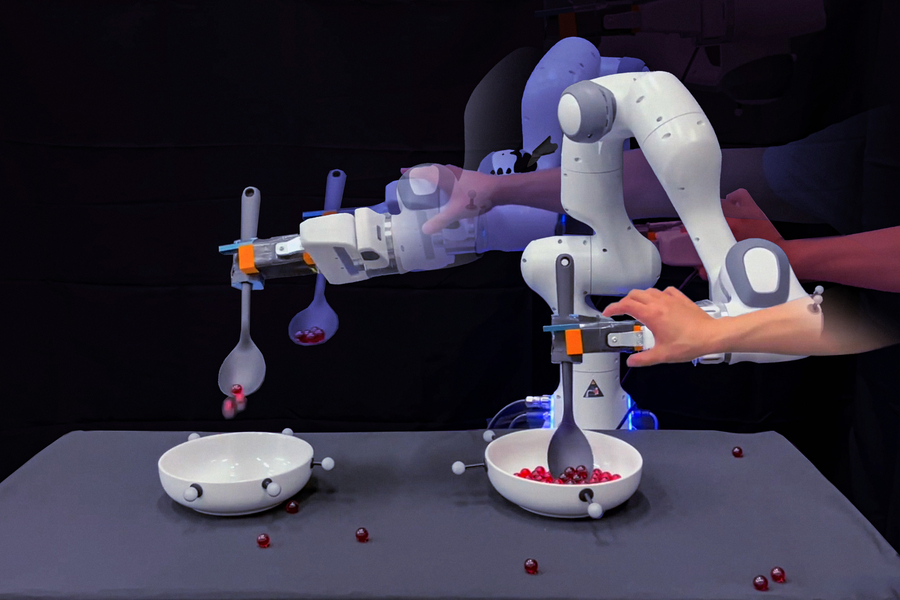AI🌈Tuesday Innovations: Home Robots to BBC's 'Doctor Who' – Exploring NVIDIA's Challenges and Profluent's Breakthroughs!
1. Home robots aided by large language models for autonomous error recovery.
2. BBC discontinues AI usage in 'Doctor Who' promotions post-viewer complaints.
3. Google, Intel, and Arm challenge Nvidia's AI chip supremacy.
4. Profluent, backed by Salesforce and Jeff Dean, pioneers AI-driven medicine discovery.
Keep exploring for deeper insights!✨
Welcome to today's edition of AI Insights! As technology continues to evolve, so does the realm of artificial intelligence. Join us as we explore the latest developments shaping the world of AI. From innovative applications in home robotics to the impact of AI in entertainment and healthcare, there's much to uncover. Let's dive into today's headlines, where advancements are reshaping industries and revolutionizing the way we interact with technology.
1. Home robots aided by large language models for autonomous error recovery.
MIT's latest research introduces a novel approach to home robot error recovery using large language models (LLMs). By breaking tasks into smaller subsets and leveraging LLMs, robots can autonomously correct errors without human intervention. This innovation addresses the challenge of navigating unstructured environments like homes, where small changes can disrupt robot functionality. Through imitation learning and task subdivision, robots can adapt to various environmental variations and self-recover from errors. This breakthrough offers promising implications for enhancing the practicality and effectiveness of home robotics.

2. BBC discontinues AI usage in 'Doctor Who' promotions post-viewer complaints.
Following complaints, the BBC announced it won't utilize AI for Doctor Who promotions anymore. The decision came after backlash from viewers regarding AI-generated content used in promotional emails and mobile notifications. Despite having followed BBC editorial processes, the corporation opted to cease AI promotion for Doctor Who. The move represents a shift from their initial intent to leverage AI for faster content creation. In the UK, where Doctor Who is produced, industry guidelines for AI use have been established. OpenAI showcased its Sora software in Hollywood, underlining AI's growing significance in the entertainment industry. The new Doctor Who season is set to debut in May on BBC and Disney+.

3. Google, Intel, and Arm challenge Nvidia's AI chip supremacy.
The UXL Foundation aims to break Nvidia's AI monopoly with open-source software. Led by tech giants like Intel, Google, and Qualcomm, the Unified Acceleration Foundation (UXL) is developing a suite to free developers from Nvidia's proprietary tech. Their goal: code flexibility across all machines and chips. Nvidia's dominance, marked by a $2 trillion market cap, stems from CUDA architecture lock-ins. UXL's project, including Intel's OneAPI standard, promises liberation. As demand surges, rival chipmakers strive for alternatives. While initially targeting AI and high-performance computing, UXL eyes Nvidia hardware support. Collaboration with Microsoft and Amazon seeks universal deployment.
/cdn.vox-cdn.com/uploads/chorus_asset/file/25343229/STK083_NVIDIA_A.jpg)
4. Profluent, backed by Salesforce and Jeff Dean, pioneers AI-driven medicine discovery.
ProGen, initially led by Salesforce, aimed to revolutionize medicine by leveraging AI to design proteins. Recently, its lead researcher, Ali Madani, launched Profluent, a startup focused on advancing gene editing for personalized therapies. Profluent's mission is to reshape drug development, beginning with patient needs and reverse-engineering solutions. By harnessing AI to predict protein sequences and optimize gene-editing systems, Profluent aims to create customized genetic medicines tailored to individual patients. Backed by prominent investors like Spark Capital and with support from Google's Jeff Dean, Profluent aims to accelerate the translation of innovative research into practical medical solutions. As competitors emerge in the burgeoning field of protein design, Profluent remains focused on scaling its platform, expanding its AI capabilities, and forging partnerships to realize its vision for the future of healthcare.

As we conclude our exploration of today's AI news, it's clear that artificial intelligence continues to push the boundaries of innovation across various domains. From enhancing the capabilities of home robots to redefining promotional strategies in entertainment, and from challenging industry giants in chip technology to revolutionizing drug discovery, AI's impact is profound and far-reaching. Stay tuned for more updates as we navigate the ever-evolving landscape of artificial intelligence. Don't forget to subscribe to stay informed about the latest advancements and trends shaping the future of technology. Thank you for joining us on this journey through the exciting world of AI!








